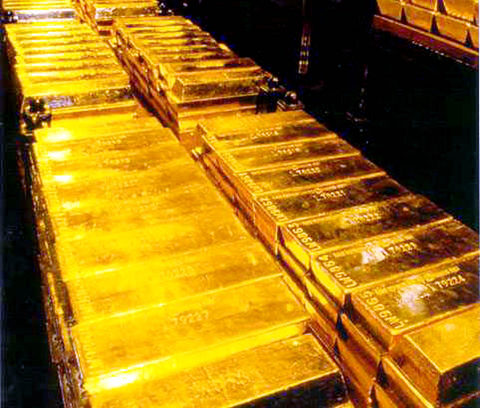The IMF said its executive board on Friday endorsed the sale of 403 tonnes of gold, worth an estimated US$13 billion, to boost lending capacity to poor countries.
The IMF said in a statement the sales would be “in a volume strictly limited to 403.3 metric tonnes, with these sales to be conducted under modalities that safeguard against disruption of the gold market.”
The 186-nation institution said the decision was a core element of a new income model to make it less dependent on its lending revenue to cover expenses, such as surveillance of members’ economic and financial policies, that the board had approved in April last year.

PHOTO: AFP
The G20 key developed and developing countries, at their April summit in London, agreed the gold sales should allow the IMF to offer favorable conditions on loans to the poorest countries.
The IMF decision comes ahead of a two-day G20 summit in Pittsburgh, Pennsylvania, that will open on Thursday. Hosted by US President Barack Obama, leaders are to discuss efforts to recover from the worst global recession in six decades and financial regulatory reform.
“I am delighted that the executive board has given its overwhelming backing to a strictly limited sale of fund gold to put the financing of the IMF on a sound long-term footing, and enable us to step up much-needed concessional lending to the poorest countries,” IMF managing director Dominique Strauss-Kahn said in the statement.
“These sales will be conducted in a responsible and transparent manner that avoids disruption of the gold market,” he said.
The IMF head in an interview out yesterday urged G20 leaders to put tackling global imbalances near the top of their priorities. Dominique Strauss-Kahn told the Financial Times that the G20 must put “some steam” behind the issue.
The amount of gold to be sold is one-eighth of the 3,217 tonnes of gold currently held by the Washington-based IMF, the third-largest official holder of gold after the US and Germany. The fund is required by its founding document to conduct all gold sales at market prices.
The IMF did not state the value of the gold to be sold but based on the current bullish near-record market price for the metal, it is estimated the sale would fetch US$13 billion.
Under the approved plan, the IMF would offer to sell gold directly to central banks “or other official sector holders if there were to be interest from such holders.”
A prime candidate could be China, which is sitting on the world’s largest foreign exchange reserves, topping US$2 trillion, and has been seeking to diversify away from the dollar.
China early this month agreed to buy the first IMF bonds for about US$50 billion and has been on a gold-buying streak, increasing its gold reserves by 75 percent from 2003 to last year, official media showed.

Sweeping policy changes under US Secretary of Health and Human Services Robert F. Kennedy Jr are having a chilling effect on vaccine makers as anti-vaccine rhetoric has turned into concrete changes in inoculation schedules and recommendations, investors and executives said. The administration of US President Donald Trump has in the past year upended vaccine recommendations, with the country last month ending its longstanding guidance that all children receive inoculations against flu, hepatitis A and other diseases. The unprecedented changes have led to diminished vaccine usage, hurt the investment case for some biotechs, and created a drag that would likely dent revenues and

Global semiconductor stocks advanced yesterday, as comments by Nvidia Corp chief executive officer Jensen Huang (黃仁勳) at Davos, Switzerland, helped reinforce investor enthusiasm for artificial intelligence (AI). Samsung Electronics Co gained as much as 5 percent to an all-time high, helping drive South Korea’s benchmark KOSPI above 5,000 for the first time. That came after the Philadelphia Semiconductor Index rose more than 3 percent to a fresh record on Wednesday, with a boost from Nvidia. The gains came amid broad risk-on trade after US President Donald Trump withdrew his threat of tariffs on some European nations over backing for Greenland. Huang further

Nvidia Corp’s GB300 platform is expected to account for 70 to 80 percent of global artificial intelligence (AI) server rack shipments this year, while adoption of its next-generation Vera Rubin 200 platform is to gradually gain momentum after the third quarter of the year, TrendForce Corp (集邦科技) said. Servers based on Nvidia’s GB300 chips entered mass production last quarter and they are expected to become the mainstay models for Taiwanese server manufacturers this year, Trendforce analyst Frank Kung (龔明德) said in an interview. This year is expected to be a breakout year for AI servers based on a variety of chips, as

HSBC Bank Taiwan Ltd (匯豐台灣商銀) and the Taiwan High Prosecutors Office recently signed a memorandum of understanding (MOU) to enhance cooperation on the suspicious transaction analysis mechanism. This landmark agreement makes HSBC the first foreign bank in Taiwan to establish such a partnership with the High Prosecutors Office, underscoring its commitment to active anti-fraud initiatives, financial inclusion, and the “Treating Customers Fairly” principle. Through this deep public-private collaboration, both parties aim to co-create a secure financial ecosystem via early warning detection and precise fraud prevention technologies. At the signing ceremony, HSBC Taiwan CEO and head of banking Adam Chen (陳志堅)